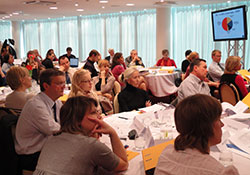Flagship course targets health financing after the economic crisis

WHO
From 11–15 April 2011, about 60 officials from government, health insurance funds and other health sector stakeholders from Estonia, Latvia, Lithuania and Poland participated in a flagship course on strengthening health systems and sustainable financing. This is the third time the course has been held, after highly successful rounds in 2009 and 2010.
“The flagship courses have been the top training events over the last three years in Estonia. They bring together all the important stakeholders in our country for the week, and we not only upgrade our competencies but are also able to discuss our own plans by comparing them with evidence,” said Ivi Normet, Deputy Secretary General for Health, Ministry of Social Affairs, Estonia.
The focus of the week’s training, held in Tallinn, Estonia, was health financing after the economic crisis. Issues covered included:
- additional revenue sources for the health sector in the country’s fiscal and economic policy;
- health system payment methods and their development;
- strategic purchasing to ensure access, quality and efficiency;
- active purchasing in public health; and
- how health technology assessment can contribute to decision-making in health financing.
“The economic crisis has prompted a reform of Latvia’s health system, based on rationalizing the use of scarce health resources. The flagship course provided a platform for discussing policy options for strengthening and developing the health system of my country, facilitated by outstanding experts in the field. The new knowledge we gained and the opportunity to interact with participants has helped us reconsider policy options and build a framework for developing and implementing changes,” said Daiga Behmane, Director, Centre for Health Economics, Latvia.
“Presentations by participants about their country experiences were very useful. The situation of the four countries before and during the economic crisis was not the same, but some of the ideas raised during presentations and in the subsequent useful discussions could be adapted in Lithuania or, at least, are worth thinking about,” said Gintaras Kacevicius, Director of the Insurance Development Department of the National Health Insurance Fund, Lithuania.
WHO/Europe coordinated the course, organized jointly with the Ministry of Social Affairs of Estonia and the Estonian Health Insurance Fund, with financial support from the European Social Fund. It provided a platform for senior officials and health sector stakeholders to discuss current and future challenges in a training setting that offers a unique and rare opportunity to interact with policy-makers. This module will be followed by another on performance assessment in late 2011.



